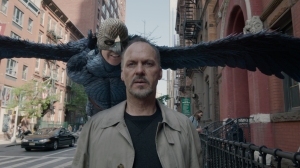For our 100th (!!) post, we will be concluding our look at the Best Picture winners with Spotlight, directed by Tom McCarthy. Starring Michael Keaton, Mark Ruffalo, and Rachel McAdams, it is rated R for some language including sexual references.
From IMDB: When the Boston Globe’s tenacious “Spotlight” team of reporters delves into allegations of abuse in the Catholic Church, their year-long investigation uncovers a decades-long cover-up at the highest levels of Boston’s religious, legal, and government establishment, touching off a wave of revelations around the world.
9.5 out of 10
Before we start, I just wanted to say a quick thank you to all… six of you who read this blog. It’s been a lot of fun for me and Zach, so thanks to everyone who has read and written.
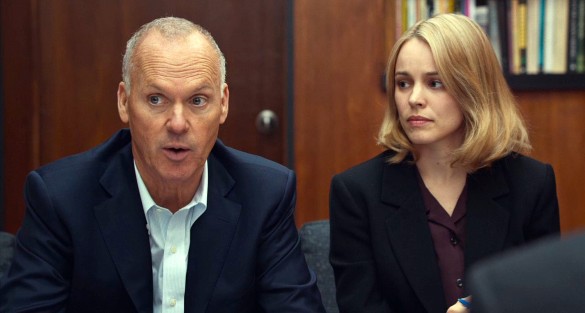 Now to main course: Spotlight. By coincidence, we happened to leave, in my opinion, the best for last. This is my best film of the year, hands down. With an incredible cast and an outstanding script, Spotlight, emulating All The President’s Men 35 years later, is an eye-opening, life changing look into the impurity of religious institutions.
Now to main course: Spotlight. By coincidence, we happened to leave, in my opinion, the best for last. This is my best film of the year, hands down. With an incredible cast and an outstanding script, Spotlight, emulating All The President’s Men 35 years later, is an eye-opening, life changing look into the impurity of religious institutions.
Michael Keaton, who might be in his second straight Best Picture winner, Mark Ruffalo, and Rachel McAdams are all fantastic, playing journalists who begin to question everything they believe in after working on uncovering molestation of allegations in the Catholic church. Ruffalo is the best, transitioning from relentless investigator to manic journalist running after cabs and through courthouses. His desperation to expose the church’s wrong doings is especially evident, providing the most memorable moment of the film by delivering a scathing speech against the church about their wrongdoings. With solid performances all around, the most impressive part of the cast is that they perfectly blend together to create a skilled and interesting group of journalists that we are rooting for all the way.
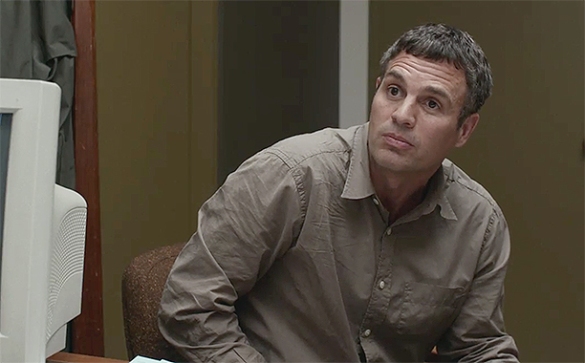
The journalistic aspect of the film provided the drama with its energy. The constant researching, interviewing, and digging is an exhaustive process, and when 9/11 comes along and hits the group like a train, that exhaustion is evident. The reality of the situation is clear. These are real people being destroyed by a real life scandal that the church is responsible for. Spotlight does an incredible job of sticking to the story and having the intensity increase with every scene. The events of the film keep managing to topple themselves.
This doesn’t have the shock value of The Revenant or the flair of The Big Short, but what makes Spotlight so special is its profundity. We see the psychological trauma of thousands of victims who suffered at the hands of one of the world’s most powerful institutions. Spotlight takes the discomfort of the situation and tackles it head on, sparing no detail and creating a story that forces you to question the everything you believe in, including the church– an institution with the implication of purity.
After the conclusion of the movie while the credits role, one can’t help but feeling despondent. The truth comes out, the church exposed, and victims finally come forward. But it’s almost impossible to keep faith– in God, in our judicial system, and in human beings– after taking it all in. If Spotlight does not make you feel uncomfortable, then it has not succeeded. Tom McCarthy takes the sensitivity of the subject of molestation and pedophilia and uses it to make the tone one of intense discomfort.
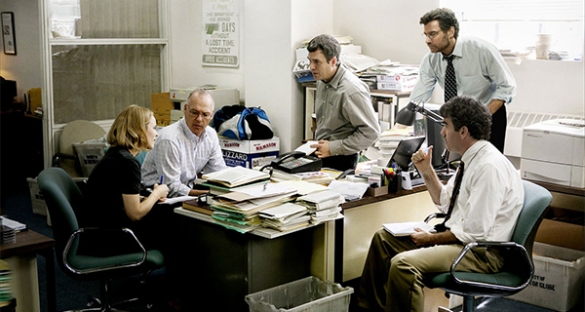
Of all the films this year, Spotlight was the one that resonated with me the most. It had the most electric performances, best written screenplay, and ultimately is the movie that will have the most significant impact on society by bringing these issues to the public’s eye on a much larger scale than the original Boston Globe article in 2002. If that isn’t a Best Picture winner, then I don’t know what is.
~Vig
9.5 out of 10
In my opinion, the only thing better than grand fiction played right is a true story that need be told being done absolute justice. Sure, crafting a movie with intricacies and moving cogs all motioning in one direction is great but, to me, nothing can quite match a film that embraces uncertainty and reality, shuns pizzaz, resists the temptation to taint its real life subject with any fabrication and chugs forward. Sometimes that means sacrificing conventional pacing. Sometimes that means banishing big, cinematic, Oscar-baiting moments. Sometimes it means earning more admiration from a viewer than sheer enjoyment.
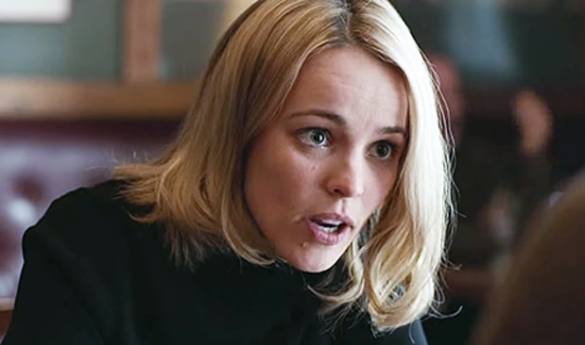
Spotlight is one of the rawest movies I’ve seen in years and stands among the best because of it. It may not offer the most riveting pacing (The first fifteen minutes are actually mostly office reorganization and story shuffling) and it’s very, very rarely loud or big yet it derives so much strength from how untreated it is. It’s difficult to explain but there’s just this accumulation of tension and intrigue that comes from watching an infantry of hard-boiled reporters slowly and carefully unearth a still-searing story. As with any fantastically daunting investigation, each answer opens up more questions.
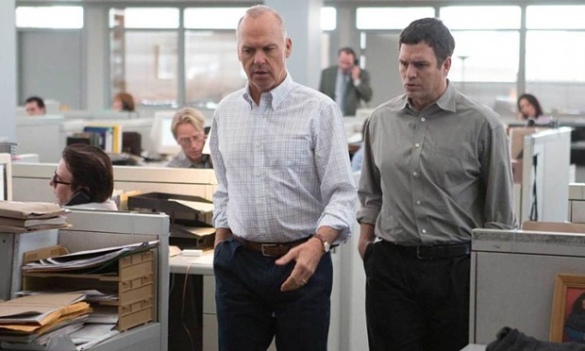
And who to carry this slow dive into an article better than this star-studded cast? Ruffalo and Keaton (among several others whom I can’t do any justice in these 500 words) deliver some whopping performances as their characters reconcile with the fact that their 9 to 5s have become an all-out ethical quest. The actors aren’t given that many monologues but any thrilling material tossed to them is handled incredibly well (Without giving away too much, Ruffalo in particular tears into a heckuva tirade on the whole thing that leaves your blood boiling).
Director Tom McCarthy’s masterwork is also an unabashed celebration of the power of the press as the Globe picks up moral slack in a city where local lawyers, politicians and, yes, the Church itself fail to do so. Not since All the President’s Men (which I will shamelessly say this one’s surpassed) has the might of the pen (as well as the perils of pushing it) been so well flexed. After seeing a whole onslaught of people who’ve looked the other way throughout the film, you’ll be more thankful than ever for journalists – who act more as crusaders than mere reporters.
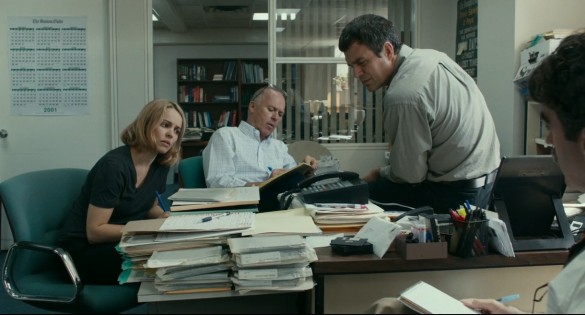
Rage-inducing? Yes, a little, this is some good ol’ fashioned muckraking after all. That tension we talked about earlier builds up but never really lets up. The film itself (again, without giving away too much) seems to communicate the problem it deals with is ongoing and you’d be hard-pressed to step out of this one without at least questioning the hypocrisy of religious institution. Overall, this contributes well to helping the whole thing pack a bigger punch.
Will this take home the Oscar? It sure is my pick at the moment and, for now, let’s just say it’s certainly hard to handwave. If it doesn’t get it, however, at least you can be sure it will earn a place as the film some lazy Journalism teachers show to their students during the Ethics unit. To me, well, that’s one of the bigger honors there is.
~Zach


